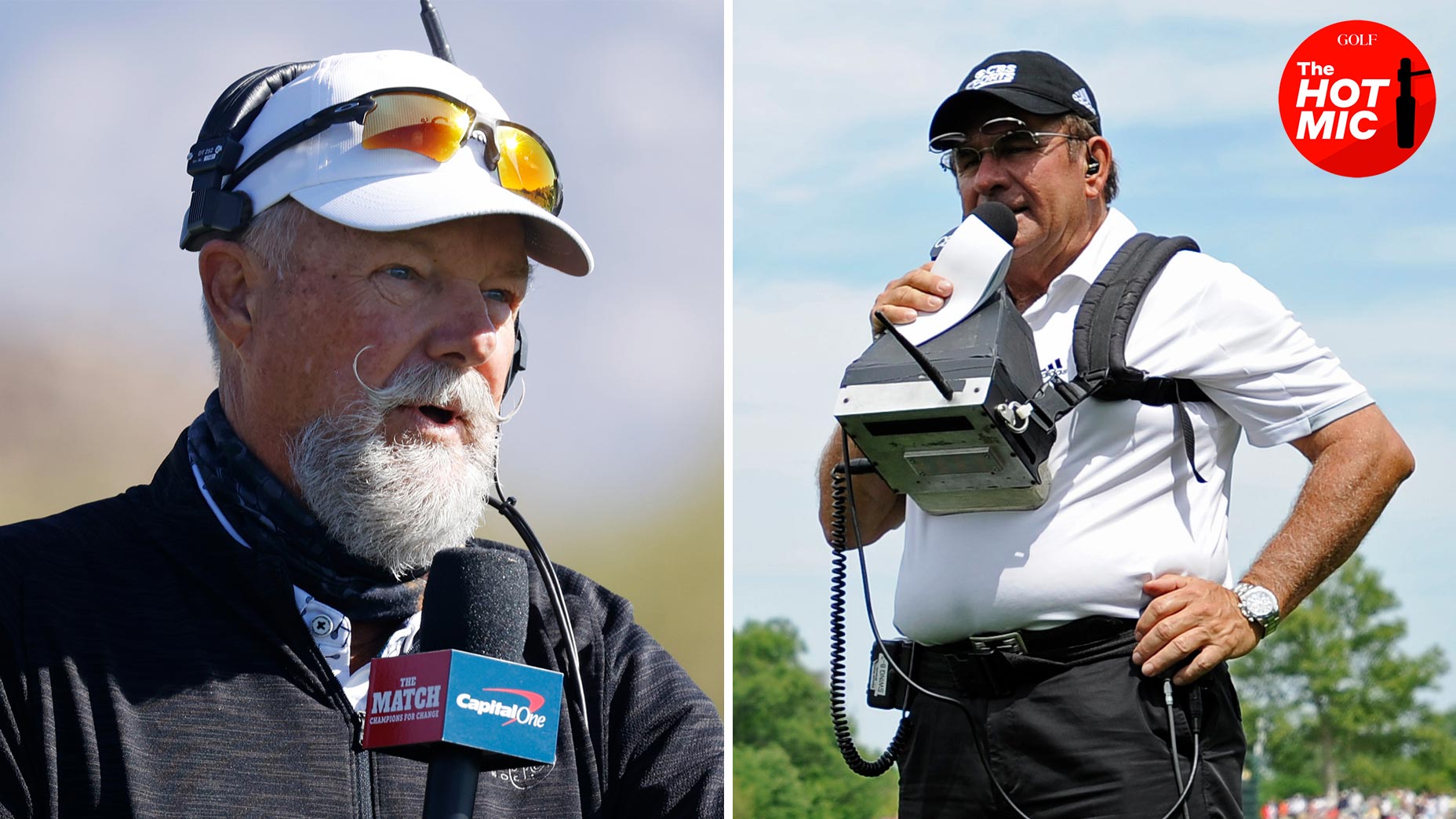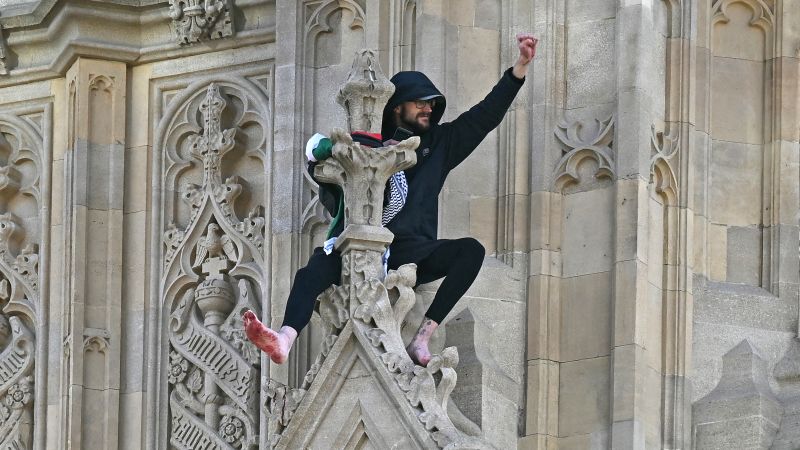How these golf-TV castoffs are finding their unfiltered voices again

Gary McCord (left) and Peter Kostis (right) are the voices behind “Off Their Rockers.”
Getty Images
Gary McCord tilts back in his chair and laughs.
“Oh, man,” he says, pausing for just a beat, the whiskers of his famed snow-white mustache curled into a grin. “Well, there’s a billion of them.”
The subject du jour is his former CBS Sports boss, Frank Chirkinian, but we could be discussing McCord’s breakfast order or favorite bird species. It wouldn’t matter. The sound of McCord’s voice spinning a yarn is comforting to the senses, like the aroma of sawdust in a woodshop or the click of a camera shutter during the last strands of sunlight. It is where it belongs.
The nostalgia helps. If you’re of a certain age, McCord and his pal, Peter Kostis, provided the soundtrack to lazy Sunday afternoons for much of your golf-watching life. Your ear is attuned to their voices, banter and sardonic jabbing. When you hear a good old-fashioned McCord wind-up, you know Kostis is wielding his bat, ready to lace a line drive to center.
The two broadcasters never lost that skill, even after CBS drove them into early retirement around the time of the last PGA Tour rights deal in 2019. The days went on but the stories never waned, and it soon became clear to them that the stories never would wane. Nor would their audience’s appetite for hearing them.
How have McCord, who is 76, and Kostis, 77, instilled this comfort in us? The answer is hiding right there in the question.
THIS STORY BEGINS AT THE END.
It was late 2019, months before PGA Tour commissioner Jay Monahan would proudly report the details of a gargantuan new media rights agreement, and Kostis and McCord had just received bad news: After decades with CBS’s golf coverage team, they were out.
Perhaps the new rights deals, which promised billions to the Tour over the next decade, influenced CBS’s vision for the future — but Kostis and McCord were given a different version of events.
“I was the first one to get called by CBS and told that they weren’t going to re-up my contract,” Kostis says. “The reason, they told me, was because the telecast had gotten stale, and so by inference, I was stale.”
He pauses.
“I took offense to that. I still take offense to that, as does Gary,” Kostis said. “My offense is that I’m coaching those people. I’m teaching them. I can relate to them, they can relate to me. Age has nothing to do with it.”
Kostis and McCord were blind-sided. Wounded. But they were also out of options. They were on the wrong side of 60 in a young man’s game, and so they made a reasonable decision: They retired.
A quiet life awaited them back in Scottsdale. After decades on the road, Kostis and McCord could finally enjoy time away from air travel and the grind of the Tour schedule. While neither of them was happy with the outcome, there was a certain relief to the news; for years, golf television had been drifting further from its ideological starting point, one that both men had witnessed under the tutelage of legendary producer Frank Chirkinian. They wouldn’t be part of golf TV anymore, but at least they wouldn’t be around to see it succumb to its worst instincts.
“Now, golf on TV is no fun to watch — none,” Kostis said. “They got more announcers. They’ve got more shots being shown — supposedly — but you got three or four people talking over every shot.
“How the hell could anybody say anything of any consequence?”
HOW LONG DID McCORD AND KOSTIS ENJOY RETIREMENT?
“About 45 minutes,” McCord said with a chuckle.
As they tell it, the work started at the “big tables” of Whisper Rock, an all-male Scottsdale club where Kostis and McCord are members — and now regulars. They had taken to holding court at the wooden tables near the driving range, sharing war stories from their years on the beat for CBS.
Their buddies took the stories well. Really well. And after a few too many nights of “bullshitting” (McCord’s word), one of the members approached the pair with an idea.
“You guys really oughta write a book or something,” the friend said. “Or even better, start a podcast…”
By that time, the sun was already setting on sports podcasting. With its casual tone and ease of access, podcasting spearheaded an audio revolution in the early 2010s — but those same strengths paved the medium’s eventual decay. There were too many mouths and not nearly enough food. The only survivors fell into two buckets: the first movers (i.e., those who got into the audio space before their competitors) and the established voices (i.e., those already famous outside of podcasting).
Kostis and McCord fit into both buckets. Golf fans had listened to them call the game for decades, a run that had brought them a degree of fame. A podcast made a lot of sense. The ex-broadcasters hired an old friend from CBS, producer Mike Abram, to keep the trains on time. And then, just a few days after they’d been pitched on the idea, they were ready to record.
One small piece of business remained: a name. The hosts liked Unplugged, a callout to their time on the mic and the nature of the show, which would feature a not-insignificant number of tales from their CBS days, but it was hardly original IP. They thought some more and, finally, the perfect name appeared — one that was simultaneously a nod to their legacy and a cheeky dig at their former CBS bosses.
Kostis and McCord started the podcast in early 2020, and slowly began building an audience. Today, the show, which is produced in partnership with GOLF.com, has built a consistent and engaged audience, but the hosts believe there is much room for growth.
More frequency might come soon enough for the bi-monthly show. Kostis and McCord are growing more restless with age, and the increasingly chaotic state of professional golf (and pro golf TV) has only sharpened their itch to work. That might mean more long days or late nights for them but it also would make for the best kind of listening, warm and funny and topical and honest.
Off Their Rockers is as varied in breadth and depth as anything in the golf audio space. One episode might involve a lengthy discussion on the nuance and genius of a golf course, bubbling with the kind of deep golf intellect that improves your own. The next might provide an insider’s look at the future of golf television followed by an extended interpolation on McCord’s newfound affinity for cryptids.
For two longtime TV guys, the podcast world, they said, feels so new media, sometimes awkwardly so. But then the light turns on, and barriers of preconception melt away. It’s not Off Their Rockers, the Podcast; it’s Peter and Gary.
“Not once have I ever felt like my age was anything but a plus,” Kostis said, “because I’ve got experience, I’ve got stories, I’ve got the opportunity to convey to people the real truth about the game, the real truth about golf on TV, all of that stuff.”
Kostis’ voice is tinged with indignance, and it’s not hard to grasp why. After a lifetime of building his golf acumen, he woke up one morning to discover he was too experienced.
“Now, I’m not going to put my hat on backwards; I’m not a fan of dumbing down the game,” he continued. “There’s too many young people out there with their podcast, and all they’re doing is acting like frat boys at a drunken party — trying to be funny, not really funny. I think Gary and I offer a perspective that can be entertaining, but also somewhat educational.”
IN THE DESK CHAIR, Gary McCord is winding up.
The question is a fastball over the heart of the plate, and we both know it. I want to know McCord’s best Frank Chirkinian story, and he’s got a good one: the story of how Gary McCord morphed from PGA Tour pro to CBS analyst.
“Frank goes, ‘Hey, I need to see you my office.’ I’m like, okay, fine. I figured I screwed up, or that was it. So I walked in his office, and he goes, ‘What are you doing next week?’ I go, ‘I’m going to the Kemper,’ which was a CBS event. He says, ‘Great, when you miss the cut, I want you to come up to the tower again.‘”
He pauses for laughter.
“That bastard, for the next three years, every time I missed the cut, which was quite often, I would just go up to the tower and get my 500 bucks and do a golf telecast.”
In many ways, this goofy start in the industry foreshadowed McCord’s frosty and sudden ending. Few people age gracefully on television because so few people are given the chance to age at all. You have to be good — really good — to stave off the inevitable, and even then, the current is pulling against you.
The cold truth is that the TV business is built around the next big thing, which also means someone else’s time is expiring. Those lucky enough to experience what it’s like to be the next big thing never forget that fact, particularly as they watch a roster of their potential replacements dot the fairways each week.
“In life, you gotta change your pitches,” McCord said. “You can’t rely on a fastball down the middle. It won’t work. So you try to do other things.”
As McCord lines up the punchline for his next joke, it hits me: This is why he makes for such comforting listening. Not because his stories are nostalgic, or because he and Kostis’ voices are familiar. But because Kostis and McCord understand it — the craft of storytelling, the nuance of tension and release, the strength of a satisfying beginning and ending. These are skills that one either has or doesn’t, and they possess a magnetism that speaks to something much deeper than age or sport.
“I never plan on retiring,” Kostis said. “When I’m too old to stand, I’ll sit in a chair and work.”
Put another way, when you have a gift, you should continue to use it. It may not always bring you fame or riches or adulation, but it will bring you something better: comfort and satisfaction.
Neither of which has an expiration date.
Watch “Off Their Rockers with Peter Kostis and Gary McCord” on YouTube.
You can reach the author at james.colgan@golf.com. To subscribe to his weekly (and free!) Hot Mic newsletter, click here.
Related
5 Things I Never Play Golf Without: David Dusek
Our 11-handicap equipment writer always brings his favorite divot repair tool, a portable speaker and some high-tech gear to the course.As long as the weather i
Donald Trump’s golf course wrecked by pro-Palestine protesters
Pro-Palestinian protesters have vandalized parts of U.S. President Donald Trump's golf course in Scotland in response to his proposal for the reconstruction of
Man holding Palestinian flag scales London’s Big Ben hours after…
CNN — Emergency services were called to London’s Palace of Westminster on Saturday a
EPD: Drunk driver parked car on golf course
EVANSVILLE, Ind. (WFIE) - Evansville police say they arrested a man after finding him drunk in his car that was parked on a golf course.Officers say they were c













